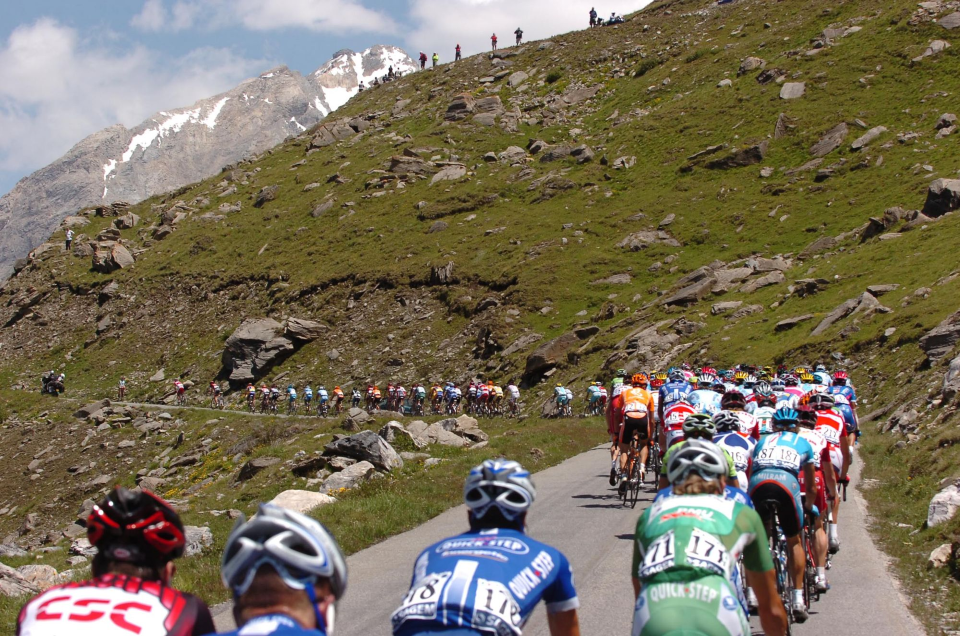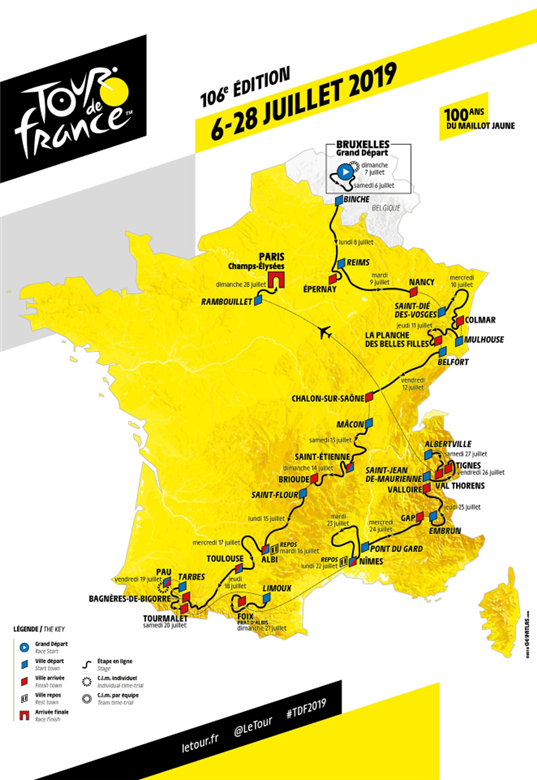2019 Tour de France route "Highest in History"
30 categorized climbs with five mountain finishes and only 54 km of time trialling touted as the “Highest Tour in history”
Unveiled today in Paris, the parcours include three mountain-top finishes over 2,000 metres, with back-to-back Alpine stages traversing the iconic climbs of the Col d’Izoard, the Col du Galibier, and the 2,770m-high Col d’Iseran, the highest paved road in Europe.
The penultimate stage of the Tour, stage 20, could decide the overall winner, wilth a 33km climb up the 2,365m high Val Thorens. Amateur cyclists will be able to ride this stage ahead of the professionals in the Etape du Tour ("a stage of the tour"). The stage includes 60 km of climbing and descending.
“This is the highest Tour in history,” said the Tour de France director Christian Prudhomme, as the race celebrates the 100th anniversary of the yellow jersey.
Chris Froome said "The number of high altitude finishes makes next year's Tour very difficult."
Just 54 km of time trialling, means the race is not entirely suited to the likes of Tom Dumoulin, who said he's "all in for the Tour next year".

The total race distance is 3460km, with the Grand Depart set for Brussels on Sat July 6 before the finish in Paris on Sun July 28.
“Holding the Grand Depart in Brussels is a wonderful way to honour the man who best represents the image of the yellow jersey, cycling’s greatest ever champion, Eddy Merckx,” Prudhomme said.
There are also seven supposedly flat stages that are best suited to the sprinters. “We are virtually guaranteed wind on one of those and confident there will be wind on a second one too,” said Prudhomme.
Five time winners Eddy Merckx, Bernhard Hinault and Miguel Indurain were all present in Paris for the route presentation.
“It’s going to be a tough, tough, tough race,” said four-time champion Chris Froome. “I’m disappointed there isn’t more time trialling, I thought there would be, and those five summit finishes mark this out. “But I can tell you Team Sky is celebrating its 10th anniversary and we really would like to win this Tour.”
Marketed as the Centenary of the introduction of the yellow jersey, in 1919 — an innovation for roadside fans to identify the race leader — next year’s edition “is a way of paying hommage to the yellow jersey,” added Prudhomme.
“Combining that with the ‘Grand Depart’ in Brussels is a wonderful way to honour the man who best represents the image of the yellow jersey, cycling’s greatest ever champion, Eddy Merckx,” Prudhomme said.
Although featuring seven mountain and five hilly (or medium mountain) stages, there is also room for seven supposedly flat stages that are best suited to the sprinters.
“We are virtually guaranteed wind on one of those and confident there will be wind on a second one too,” said Prudhomme.
Asked where that left the sprinters, Prudhomme said cycling’s fast men were too proud to let a few hills stand in their way.
“Mark Cavendish, the greatest sprinter in Tour history, showed last year the attitude our sprinters have,” he said.
Cavendish last year was one of several sprinters to struggle through a difficult mountain stage only to be eliminated after missing the time cut.
“The Champs Elysees is still the most mouth-watering sprint on the cycling calendar and they all want to get there,” he explained.
Britain’s Cavendish, who with 30 stage wins is just four short of Merckx’s Tour record of 34, said: “It might look harder but the 2019 Tour will be easier to finish than the 2018 one, which was virtually impossible for a sprinter like me.”
With an abundance of potentially decisive mountain stages, the scope for stealing time from rivals during long time trials has been limited.
Next year’s edition features a 27km-long team time-trial on stage two around the city centre of Brussels and just one other, individual time trial over 27km on stage 13 on undulating terrain around Pau.
“The planning here means it is impossible to win this Tour unless you are a great climber,” Prudhomme said.
Defending champion Thomas said he was still just trying to enjoy the fact he was champion.
“It’s been crazy since Paris,” he said. “And it’s nice to be here to see this live presentation, but now I need to get back on the bike and get back on racing form,” said the Welshman.
Route designer Thierry Gouvenou, however, said he felt Thomas’s teammate and four-time champion Froome may be stronger next year.
“Of the two of them I’d say Froome was better equipped on this type of route,” he said when pressed on the issue. “Froome remains an iconic leader for Sky, and Thomas has found his Holy Grail’.”
2019 Tour de France Route
| Stage | Date | Start / Finish | Distance | |
| Stage 1 | Sat July 6 | Bruxelles to Bruxelles | 192 km | |
| Stage 2 | Sun July 7 | Bruxelles to Bruxelles | 27 km | TTT |
| Stage 3 | Mon July 8 |
Binche to Epernay
|
214 km | |
| Stage 4 | Tue July 9 |
Reims to Nancy
|
215 km | |
| Stage 5 | Wed July 10 | Saint-Dié-des-Vosges to Colmar | 169 km | |
| Stage 6 | Thu July 11 | Mulhouse to Planche des Belles Filles | 157 km | Mountain Finish |
| Stage 7 | Fri July 12 | Belfort to Chalon-sur-Saône | 230 km | |
| Stage 8 | Sat July 13 |
Mâcon to Saint-Étienne
|
199 km | |
| Stage 9 | Sun July 14 |
Saint-Étienne to Brioude
|
170 km | |
| Rest Day | Mon July 15 | |||
| Stage 10 | Tue July 16 |
Saint-Flour to Albi
|
218 km | |
| Stage 11 | Wed July 17 |
Albi to Toulouse
|
167 km | |
| Stage 12 | Thu July 18 |
Toulouse to Bagnères-de-Bigorre
|
202 km | Mountain |
| Stage 13 | Fri July 19 |
Pau to Pau
|
27 km | ITT |
| Stage 14 | Sat July 20 |
Tarbes to Tourmalet
|
117 km | Mountain Finish |
| Stage 15 | Sun July 21 |
Limoux to Foix
|
185 km | Mountain Finish |
| Rest Day | Mon July 22 | |||
| Stage 16 | Tue July 23 |
Nîmes to Nîmes
|
177 km | |
| Stage 17 | Wed July 24 |
Pont du Gard to Gap
|
206 km | |
| Stage 18 | Thu July 25 |
Embrun to Valloire
|
207 km | Mountain |
| Stage 19 | Fri July 26 | Saint-Jean-de-Maurienne to Tignes | 123 km | Mountain Finish |
| Stage 20 | Sat Jul 27 |
Albertville to Val Thorens (Etape du Tour)
|
131 km | Mountain Finish |
| Stage 21 | Sun Jul 28 | Rambouillet to Paris Champs-Elysees | 127 km |

